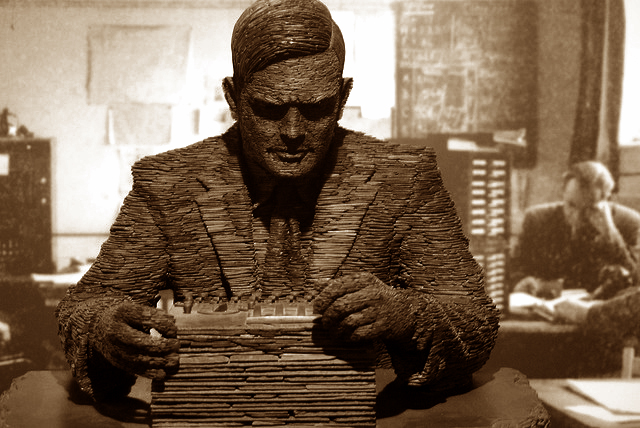
[HOME] [ISSUE] [ARCHIVES] [ABOUT] [GUIDELINES] [BLOG]  The Clock Houseby Sonya Taaffe"Be kind, resourceful, beautiful, friendly, have initiative, have a sense of humour, tell right from wrong, make mistakes, fall in love, enjoy strawberries and cream … do something really new." —Alan Turing, "Computing Machinery and Intelligence" (1950) Come ghost out of the machine, Christopher, the clouds are gathering in Cheshire and Aquila and beyond the darkening lens the last of the boy-martyrs are being put to bed with a glass of milk and an apple, immaculate faces sweetly sleeping out wars, plagues, apologies. Here is Prospero of the decision problem who drowned his books in cyanide and his wanly smiling Ariel, long freed from the equivocations of flesh, the absent-minded atheist and his good angel haloed with the sun in hindsight over Canal Street and a saint's blue shoulder— Christopher, as if you never fought or fucked in Alan's muddled, book-racked room between the bicycle clips and the chess notations, Ravel's concerto crackling on the 78 that late, wet spring of '32. You took Wittgenstein's classes and a double First and wrote of numbers as real as identities, irrational, integral and complex, a light-lashed theorist with a dark, diffident glance, not talking of night gasps or sunlit, starch-white beds. He was your runner, bearing back like laurels the hot smudge of lakeland heather or the breakneck shiver of Sark's summer waves, your pillow book of the night-lit ward, reading his dark hair with sweating fingers until your fever broke and no one's heart with it. He sent punch-cards for postcards, his war work as vague as yours was a simple arithmetic of empty seats and chalk-cold afternoons, the endless subtracting of Cambridge, stained glass, coal, and undergraduates. You thieved his tea-mug off its chain each time, a pair of profs to choose between—the thin twist of wrists like piano wire, a static crackle of a laugh— unbreakable cipher and key of Dilly's Grecian eye. Your parents met him at the graveside, hatless and mannerless, an old page of fixed stars fisted in his pocket like a ring. Your daughters met him on Market Street, their shabby, alchemical half-uncle who bought them ice-creams and told them the story of Snow White and maybe still, long before you, died. This is where you disappear, Christopher, the vanishing point Alan ran to as his program was pulled from its tapes. What can I construe from a letter, a photograph? The body is safe as glass houses, the mind a black box. I can smash these screens, but I cannot know you any more than a message from the unseen world— the dead who are noise and incalculable and memory the most passing machine of all, Christopher, unless you come to tell me of a slow twilight on the Cam, of two voices talking drowsily of Delphinus and von Neumann, central limits, cinema, saying no, but look here, meaning love. Poems and short stories by Sonya Taaffe have won the Rhysling Award, been shortlisted for the SLF Fountain Award and the Dwarf Stars Award, and appeared in anthologies such as The Moment of Change: An Anthology of Feminist Speculative Poetry, People of the Book: A Decade of Jewish Science Fiction & Fantasy, Last Drink Bird Head, The Year's Best Fantasy and Horror, The Alchemy of Stars: Rhysling Award Winners Showcase, The Best of Not One of Us, and Trochu divné kusy 3. Her work can be found in the collections Postcards from the Province of Hyphens and Singing Innocence and Experience (Prime Books) and A Mayse-Bikhl (Papaveria Press). She is currently on the editorial staff of Strange Horizons. She holds master's degrees in Classics from Brandeis and Yale and once named a Kuiper belt object. Photography: adapted from Turing, by Simon Bisson. 
|